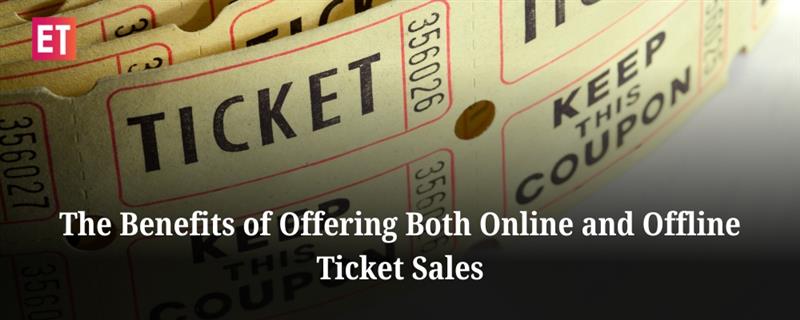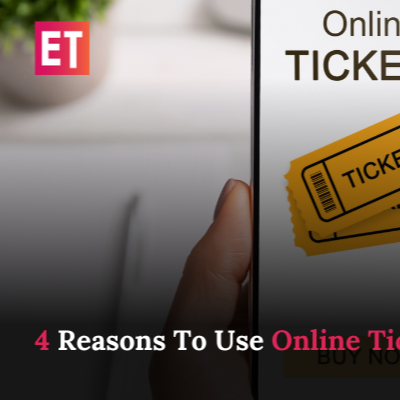The Benefits of Offering Both Online and Offline Ticket Sales

Today’s world is very fast paced, with technology being the driving force of everything. Event organizers now have many different tools that they use to ensure that operations are smooth and attendance is ideal. One such method is the way that they choose to sell tickets. Online and offline ticket sales are the core focus on event organizers in today’s day and age, which allows them to cater to a wide audience, helping them build a dual channel strategy.
In this blog, learn all about the benefits of online and offline ticket sales.
Increased Accessibility
One of the main advantages of both online and offline ticket sales is increased accessibility for a huge audience. Online ticket sales mean that customers can purchase tickets from anywhere, with their comfort and ease being priority. This eliminates the need for customers to be restricted based on box office hours. Many customers have now shifted to buying things online, which means that providing a seamless purchasing experience is key to allowing them to actually attend the event. With more attendees coming in, it becomes a great deal, allowing for things to happen in a smoother way.
Having said that, not everyone has access to online tools and methods. This means that there should also be an option for people to buy tickets in person, as they feel comfortable. This allows them to cater to older generations as well who are not as tech-savvy. This way, everyone is involved, and no one feels left out.
Expanded Market Reach
Event planners can greatly increase their market reach by combining online and offline ticket sales. Promoters can reach people who might not live around the event site by using online platforms to reach a worldwide audience. Large-scale events that draw people from different areas, such concerts or festivals, benefit greatly from this feature.
Enhanced Customer Experience
At the end of the day, customer experience is what matters the most when it comes to making an event a huge success. If a customer is happy, then that directly affects the success of the event. Large-scale events Online ticket sales give added convenience features like those of instant confirmation emails. Not just that, but they can also compare different ticket prices online, which again allows for giving customers the convenience and ease that they require.
Offline ticket sales enhance customer experience by providing them that personal touch with adds to customers value. Interacting directly with staff means that they can have all of their questions answered in the best way. these can be any concerns at all that they might have in relation to seating arrangements or event anything at all about the event. They also have access to any direct promotions that might be happening at that time, that might not be available online at all times.
Improved Sales Opportunities
For event planners, the mix of offline and online ticket sales generates several revenue sources. According to research, a sizable portion of event attendees still use conventional methods, although a considerable portion prefer to purchase tickets online. By accommodating both tastes, organisers can increase their market share.
Additionally, having both choices enables sales-boosting targeted promotions. Offering early bird discounts only online, for example, can encourage early purchases while preserving the option for last-minute customers to buy tickets at the door on the day of the event. Because it may accommodate different purchase behaviours, this flexibility guarantees that organisers maximise their potential earnings.
Data Collection and Insights
Making use of the online platform means that organizers can get very valuable data that can help them make the best decisions. Not just that, but they can also form future marketing strategies in line with that, which can help make event planning so much easier. By tracking customer behavior, event planners can have the right idea about popular purchasing times, which can help them resonate with different audiences in the best way.
Offline ticket sales might not give such detailed analytics, but they can definitely provide insights in line with market trends and preferences, which is also invaluable data for event planners who can then know the best way to sell tickets. This can include physical locations and also better strategies which can allow them to work in the right direction.
Cost Effectiveness
Online ticketing platforms come with lower costs, since there are no costs associated with physical locations then. Furthermore, there is no need to manage cash transactions either that way, which makes the entire system a whole lot simpler, minimizing human error as well.
Offline ticket sales can also be very cost effective, but only if the entire process is managed very well. For example, if they partner up with local businesses, then the overhead costs can be minimized largely. Furthermore, they also get an additional revenue source that way, through commission structures.
Enhanced Security Measures
In order to combat fraud, online ticketing systems usually include sophisticated security measures like encrypted transactions and distinct QR codes. Customers' trust in the buying process is increased by these actions.
Even though offline sales can seem more susceptible to problems like fake tickets or cash handling mistakes, these risks can be successfully reduced by using secure payment mechanisms (like card readers) and providing adequate training for employees.
So overall, having both options is a very powerful strategy that can benefit everyone involved in the process. These methods can allow for creating a system that enhances the event experience for everyone involved in the process, helping build long lasting relationships for everyone.
Share With Your Community!
In This Article


